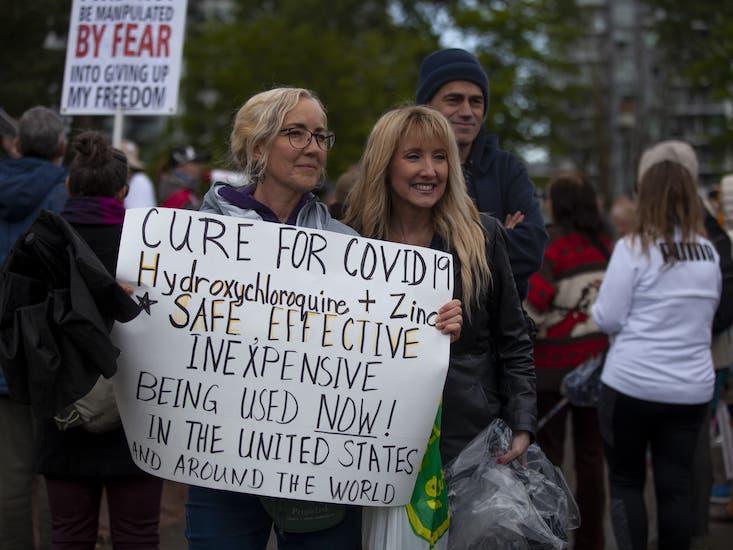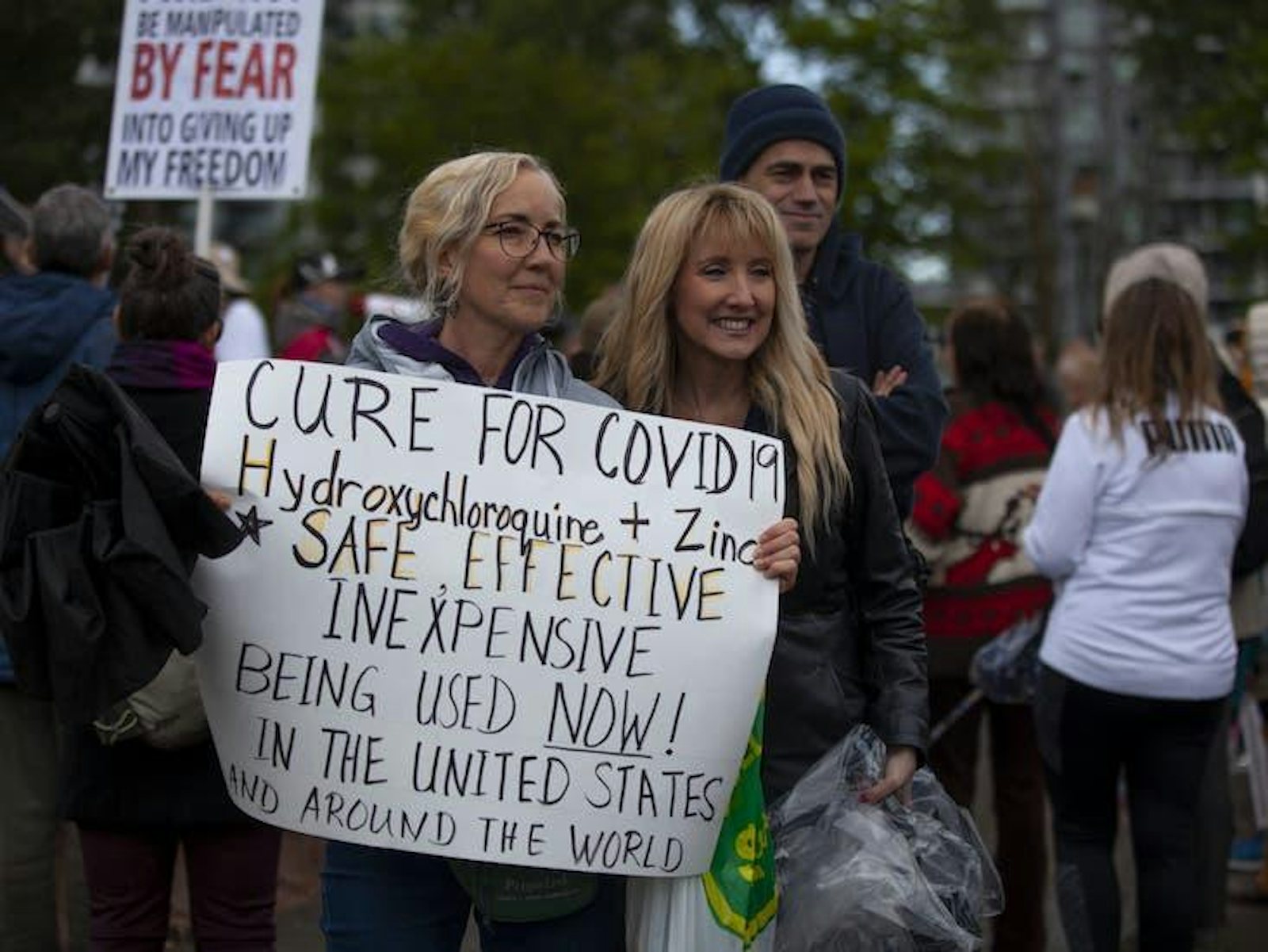
The images are everywhere: People crowded face-to-face in swimming pools, shoulder-to-shoulder in indoor bars, cheering without masks at a rally held by President Trump, who often downplays the global pandemic. Now, as many public health experts predicted, waves of new COVID-19 infections and deaths are rolling across the South and West. Many, still practicing social distancing, look at their fellow Americans and ask, “What are they thinking?”
We turned to Steven Pinker for help with an answer. The professor of psychology at Harvard, author of widely discussed books, including How the Mind Works and most recently, Enlightenment Now, sees the deep-seated mindset, tribalism, at work in people’s defiance of health recommendations. But it’s more than a tribalism of being with your crowd. “There’s a moralistic component to this kind of tribalism, mainly that people tend to see their own tribes as victims of some kind of oppression or harm by some rival coalition,” Pinker says, his distinctive mass of gray hair filling the Zoom screen. “They believe their actions on behalf of the group, even if symbolic, are a kind of justice, a kind of settling the score, making a statement, advancing a moral cause—as strange as that may be to those of us who are not part of that coalition, and might even have contempt for that cause. But from the inside, it always feels as if your group has been victimized, has been a longstanding victim of a series of affronts and harms for which you seek redress. And that’s common in the invented histories and myths and narratives of many peoples.”
When there is some belief that is incompatible with the belief, ‘I’m in control, I’m good, I’m competent,’ that’s when the rationalizations go into overdrive.
Pinker says it can be easier to understand the effect of tribalism by putting the shoe on the other foot. “Some of the people on the political right could, indeed, ask that question of the people showing up at Black Lives Matter rallies. They’re crowded together. They’re shouting. They’re chanting. A lot of them are not wearing masks. If we imagine answering that person’s question from the point of view of our buddies on the street protesting that Black Lives Matter, we can get probably some insight, even if we have our loyalties as to which is a legitimate cause and which is the not-so-legitimate cause. But you’re asking about psychology, about what people could possibly be thinking. Well, what could they be thinking in the street, shouting slogans without a mask? What could the public health experts be thinking, telling people it’s OK to do that?”
Science is continually butting heads with politics and religion. The COVID-19 crisis is foremost on our minds now. But climate change, vaccination, and genetically modified food are also cultural battlefields du jour. Dan Kahan, a professor of law and psychology at Yale, heads the Cultural Cognition Project at the university, which explores how cultural values shape public risk perceptions. He has shown, time and again, that the need to belong to a group, usually political or religious, overrides the facts of science. Kahan, who was unable to be interviewed, has written in Nature: “People find it disconcerting to believe that behavior that they find noble is nevertheless detrimental to society, and behavior that they find base is beneficial to it. Because accepting such a claim could drive a wedge between them and their peers, they have a strong emotional predisposition to reject it.”
Pinker agrees, but stresses that doing the right thing is never easy for anybody. “With coronavirus, it’s genuinely hard to know whether surfaces are potential vectors, whether six feet is enough or not enough, whether masks help or don’t help,” Pinker says. “From a scientist’s point of view, it’s not surprising the information would shift. That’s because our natural state is ignorance. We can only learn from data, and as the data comes in, our state of knowledge and best practices will change. But, partly because people think of experts as oracles, as opposed to experimenters and exploiters of trial and error, there’s a presumption that either the experts know what is the best policy from the get-go, or else they are incompetent and ought to be replaced. That’s opposed to what we know to be the correct situation in science—namely, no one knows anything, and you have to learn.”
But even learning, Pinker adds, doesn’t guarantee confidence. “As Kahan has shown, even those of us who think we have enlightened beliefs on evolution, climate change, coronavirus, don’t have the expertise to come to a reasoned conclusion,” Pinker says. “So we trust the scientists. And we’re right to do so because scientists do have methods more likely to lead to the truth than the conspiracy theorists and kooks. But if you don’t have solidarity with The New York Times, NBC, CNN, Harvard University, and the World Health Organization—you think they’re just another interest group or just another tribe—then you’ll be receptive to some alternative source of information. Just like people with respectable beliefs trust the public health scientists.”
Leon Festinger, a psychologist, coined in the 1950s one of the most famous terms in psychology, “cognitive dissonance.” Over many years and in many experiments, Festinger proved that when faced with an inconvenient truth about an action they wish to take, people will inevitably devise a rationalization to support their action. (Festinger, whom I had the honor of knowing, was a heavy smoker, a textbook example of cognitively dissonant behavior: smoking even though you believe it will give you cancer. Festinger died at age 69 of cancer.)
Pinker says motivations in the age of COVID-19 go beyond cognitive dissonance. “It isn’t just that people are logicians and they’re bothered by contradictions,” he offers. “They’re really bothered by facts that seem to challenge their self-image as competent, autonomous, and moral. I think the better interpretation of Festinger’s findings is not so much that all your thoughts have to be consistent. Probably a lot of our thoughts aren’t consistent. We just don’t think them through. But when there is some belief that is incompatible with the belief, ‘I’m in control, I’m good, I’m competent,’ that’s when the rationalizations go into overdrive.”
And, Pinker contends, rationalizations almost invariably take the rosy, individualistic view. “A lot of people don’t wear seat belts. Which is foolish because the outcome of an accident could be catastrophic. But people are correct in thinking that, more likely than not, they won’t be killed in a car crash. Part of it is that the individual risk is low. But it is foolish collectively. And unlike a car crash, getting infected with the coronavirus could be endangering others.”
Can people change? “The question might be, ‘Does a reduction in cognitive dissonance, rationalization, have some kind of finite elasticity?” Pinker says. “Can you stretch it only so far before it actually will break? And I think the answer has to be ‘Yes.’ Take the doomsday cult that Festinger infiltrated in 1950 that was the basis for the theory of cognitive dissonance. Namely, what happens to the cult members on December 31, when the world doesn’t come to an end? Now what do you do? A lot of them doubled down, but a lot of them didn’t. People left the cult. So that can happen. There is a reality principle. We can push back against it so far, but opinions do change when they have a major collision with the facts.”
Robert Bazell is an adjunct professor of molecular, cellular, and developmental biology at Yale. For 38 years, he was chief science correspondent for NBC News.






























